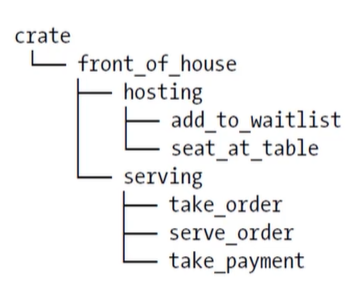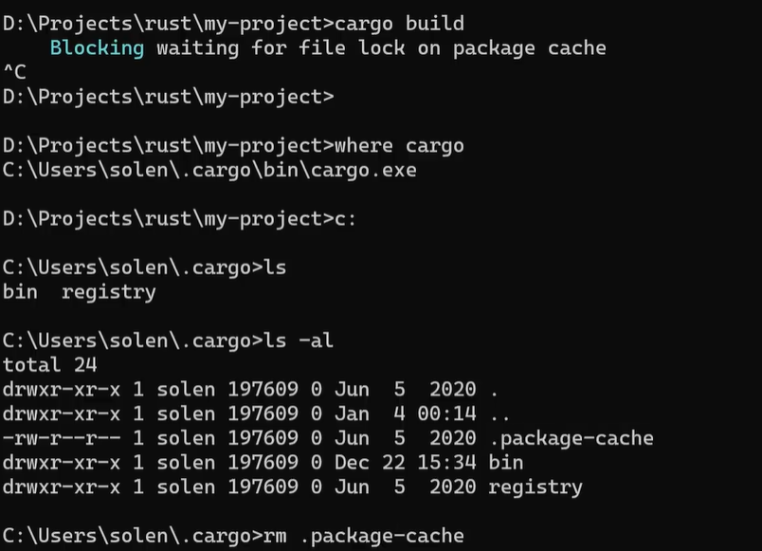1、Rust 的代码组织
代码组织主要包括:
哪些细节可以暴露,哪些细节是私有的
作用域内哪些名称有效
模块系统:
Package(包): Cargo 的特性,让你构建、测试、共享crate
Crate(单元包):一个模块树,它可产生一个 library或可执行文件
Module(模块)、use:让你控制代码的组织、作用域、私有路径
Path(路径):为 struct、function或module 等项命名的方式
Crate的类型:
binary
library
Crate Root:
是源代码文件
Rust编译器从这里开始,组成你的Crate的根Module
一个Package:
包含1个Cargo.toml,它描述了如何构建这些Crates
只能包含0-1个 library crate
可以包含任意数量的 binary crate
但必须至少包含一个crate (library 或binary)
Cargo 的惯例:
src/main.rs:
binary crate的crate root
crate名与package名相同
src/lib.rs:
package 包含一个 library crate
library crate 的 crate root
crate 名与package名相同
Cargo 把crate root文件交给rustc来构建 library或 binary
一个Package 可以同时包含src/main.rs和 src/lib.rs
一个binary crate,一个library crate
名称与package名相同
一个Package可以有多个binary crate:
文件放在 src/bin
每个文件是单独的 binary crate
Crate的作用
将相关功能组合到一个作用域内,便于在项目间进行共享
防止冲突
例如 rand crate,访问它的功能需要通过它的名字: rand
定义module来控制作用域和私有性
Module:
在一个crate内,将代码进行分组
增加可读性,易于复用
控制项目(item)的私有性。public、private
建立 module:
mod 关键字
可嵌套
可包含其它项(struct、enum、常量、trait、函数等)的定义
例如:在src目录下建立一个lib.rs文件
mod front_of_house {
mod hosting {
fn add_to_waitlist() {}
fn seat_at_table() {}
}
mod serving {
fn take_order() {}
fn serve_order() {}
fn take_payment() {}
}
}
Module

src/main.rs和 src/lib.rs叫做crate roots:
这两个文件(任意一个)的内容形成了名为crate的模块,位于整个模块树的根部
整个模块树在隐式的crate模块下
2、路径(path)
为了在Rust的模块中找到某个条目,需要使用路径。
路径的两种形式:
绝对路径:从crate root开始,使用crate 名或字面值 crate
相对路径:从当前模块开始,使用self,super或当前模块的标识符
路径至少由一个标识符组成,标识符之间使用::。
mod front_of_house {
pub mod hosting {
pub fn add_to_waitlist(){}
}
}
pub fn eat_at_restaurant() {
// 绝对路径
crate::front_of_house::hosting::add_to_waitlist();
// 相对路径
front_of_house::hosting::add_to_waitlist();
}私有边界( privacy boundary)
模块不仅可以组织代码,还可以定义私有边界。
如果想把函数或struct等设为私有,可以将它放到某个模块中。
Rust中所有的条目(函数,方法,struct,enum,模块,常量〉默认是私有的。
父级模块无法访问子模块中的私有条目
子模块里可以使用所有祖先模块中的条目
pub关键字
使用pub 关键字来将某些条目标记为公共的
super关键字
super:用来访问父级模块路径中的内容,类似文件系统中的..
fn serve_order() {
}
mod back_of_house {
fn fix_incorrect_order(){
cook_order();
super::serve_order();
}
fn cook_order() {
}
}pub struct
pub放在 struct 前:
- struct是公共的
- - struct的字段默认是私有的
struct的字段需要单独设置pub来变成公有。
mod back_of_house {
pub struct Breakfast {
pub toast:String,
season_fruit:String,
}
impl Breakfast {
pub fn summer(toast:&str)->Breakfast {
Breakfast {
toast:String::from(toast),
season_fruit:String::from("peachs"),
}
}
}
}
pub fn eat_at_restaurant() {
let mut meal = back_of_house::Breakfast::summer("Rye");
// 这里是公有的,可以访问
meal.toast = String::from("Wheat");
println!("I'd like {} toast please",meal.toast);
// 这里是私有的,不能访问
meal.season_fruit = String::from("blueberries");
}pub enum
pub放在 enum前:
enum是公共的
enum 的变体也都是公共的
mod back_of_house {
pub enum Appetizer {
Soup,
Salad,
}
}use关健字
可以使用use关键字将路径导入到作用域内
仍遵循私有性规则
mod front_of_house {
pub mod hosting {
pub fn add_to_waitlist(){}
}
}
use crate::front_of_house::hosting;
pub fn eat_of_resttarurant() {
hosting::add_to_waitlist();
hosting::add_to_waitlist();
hosting::add_to_waitlist();
}使用use来指定相对路径
mod front_of_house {
pub mod hosting {
pub fn add_to_waitlist(){}
}
}
use front_of_house::hosting;
pub fn eat_of_resttarurant() {
hosting::add_to_waitlist();
hosting::add_to_waitlist();
hosting::add_to_waitlist();
}use的习惯用法
函数:将函数的父级模块引入作用域(指定到父级)
struct,enum,其它:指定完整路径(指定到本身)
use std::collections::HashMap;
fn main() {
let mut map = HashMap::new();
map.insert(1, 2);
}同名条目:指定到父级
use core::fmt;
use std::io;
fn f1 () -> fmt::Result{
}
fn f2 () -> io::Result{
}
fn main() {
}as关键字
as关键字可以为引入的路径指定本地的别名
use core::fmt::Result;
use std::io::Result as IoResult;
fn f1 () -> Result{
}
fn f2 () -> IoResult{
}
fn main() {
}使用pub use重新导出名称
使用use将路径(名称)导入到作用域内后,该名称在此作用域内是私有的。
mod front_of_house {
pub mod hosting {
pub fn add_to_waitlist(){}
}
}
pub use crate::front_of_house::hosting;
pub fn eat_of_resttarurant() {
hosting::add_to_waitlist();
hosting::add_to_waitlist();
hosting::add_to_waitlist();
}pub use:重导出
将条目引入作用域
该条目可以被外部代码引入到它们的作用域
使用外部包(package)
Cargo.toml添加依赖的包(package)
use将特定条目引入作用域

用法请参考:Rust的库
下载比较慢的时候 可以切换下载源 在.cargo文件夹下创建一个config文件 没有后缀,贴入下面的代码
[source.crates-io]
registry = "https://github.com/rust-lang/crates.io-index"
# 指定镜像
replace-with = 'ustc' # 如:tuna、ustc,或者 rustcc 指定一个即可
# 中国科学技术大学
[source.ustc]
registry = "https://mirrors.ustc.edu.cn/crates.io-index"
# 清华大学
[source.tuna]
registry = "https://mirrors.tuna.tsinghua.edu.cn/git/crates.io-index.git"
# rustcc社区
[source.rustcc]
registry = "https://code.aliyun.com/rustcc/crates.io-index.git"标准库(std)也被当做外部包
不需要修改Cargo.toml来包含std
需要使用use将std 中的特定条目引入当前作用域
使用嵌套路径清理大量的use语句
如果使用同一个包或模块下的多个条目
可使用嵌套路径在同一行内将上述条目进行引入:
路径相同的部分::{路径差异的部分}
use std::{cmp::Ordering,io};
use std::io::{self, Write};
fn main() {
}通配符*
使用*可以把路径中所有的公共条目都引入到作用域。
注意:谨慎使用应用场景:
测试。
将所有被测试代码引入到tests模块
3、将模块内容移动到其它文件
模块定义时,如果模块名后边是“;”,而不是代码块:
Rust会从与模块同名的文件中加载内容
模块树的结构不会变化
如:
lib.rs:
mod front_of_house;
pub use crate::front_of_house::hosting;
pub fn eat_of_resttarurant() {
hosting::add_to_waitlist();
hosting::add_to_waitlist();
hosting::add_to_waitlist();
}front_of_house.rs:
pub mod hosting;创建front_of_house文件夹:hosting.rs:
pub fn add_to_waitlist(){}随着模块逐渐变大,该技术让你可以把模块的内容移动到其它文件中